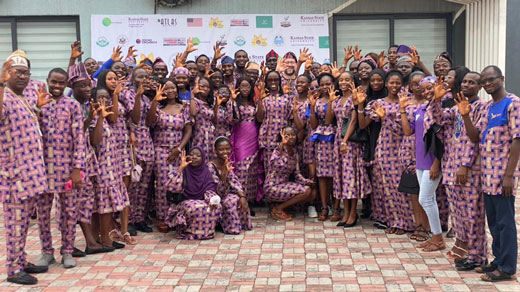February 23, 2024
K-Staters deliver permaculture design certification course in Nigeria

Olalekan A. Sipasi, "Sipasi," a doctoral candidate in horticulture, his advisor Jeremy S. Cowan, assistant professor of sustainable food production systems in the horticulture and natural resources department, and Brandon W. Kliewer, associate professor of civic leadership at the Staley School of Leadership, recently delivered two permaculture design certificate courses in Nigeria.
Prior to joining K-State, Sipasi established the ProtectOzone Sustainable Livelihood Initiative, a nonprofit in Nigeria. This organization focuses on training youth, women and beginning farmers in sustainable agriculture practices to combat poverty and food insecurity.
In 2020, Sipasi completed his own permaculture design certificate from K-State and the Kansas Permaculture Institute. In learning about permaculture, an ethics-based design system which seeks inspiration from natural ecosystems, he recognized its potential to impact food production, community development, business planning, curriculum design and other systems beyond just land-based contexts. This experience, and the potential he saw, inspired him to bring permaculture education back home in Africa. He fervently believes that Nigeria, in particular, can benefit from integrating permaculture ethics and principles to address its growing hunger crisis.
Building upon the success of a similar project in 2022, Sipasi sought funding from the U.S. Consulate General in Lagos, Nigeria, during the 2023 cycle to deliver two permaculture design certificate short-courses. His successful track record, dedication to lifting up the people of Nigeria and compelling vision of resilient local food systems all contributed to his organization being awarded this grant.
Permaculture is built around three ethics — Earth care, people care and future care — and 12 principles. But, even an ethical design system requires champions to enact change. Recognizing this, Sipasi recruited Kliewer to develop new modules, linking leadership principles with the ethics and principles of permaculture.
Sipasi leveraged relationships with the College of Plant Science and Crop Protect at the Federal University of Agriculture, Abeokuta, and the department of marine sciences at the University of Lagos, both institutions dedicated to a more sustainable Nigeria, to host the courses on their respective campuses. This provided students and teachers with safe, clean classrooms, access to farms and natural resources and local expertise familiar with the natural systems in each region.
Through these permaculture design certificates and two additional courses in 2022, Sipasi can now lay claim to have trained more than 100 permaculturists in his home country, giving rise to a national permaculture organization, the Greenland Permaculture Association, and a direct invitation from the U.S. Consulate to apply for additional grants to continue his important work.
"A well-nourished Nigeria," Sipasi said, "is a prosperous and a secure Nigeria."
His advocacy for permaculture reflects his passion for addressing societal challenges in Nigeria. Through education and action, Sipasi hopes to shape a more resilient and sustainable future for his homeland. But, Sipasi's ambition doesn't stop in Nigeria. His vision for ProtectOzone's future extends across Africa. He plans to focus the next round of funding on taking sustainable agriculture courses to Ghana and the Benin Republic, with more locations in the future.
Sipasi, and the permaculture design certificate team, extend their appreciation to the U.S. Consulate in Lagos, Nigeria, for primarily funding the project, K-State's Staley School of Leadership and Department of Horticulture and Natural Resources for their support, and the Kansas Permaculture Institute for guidance.